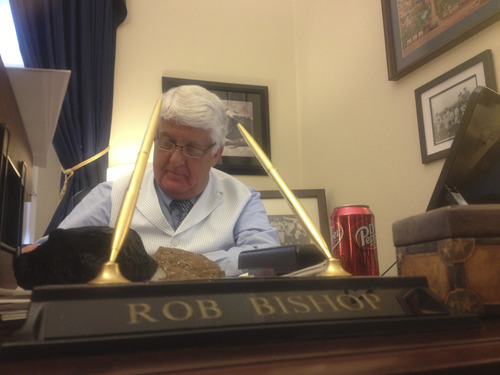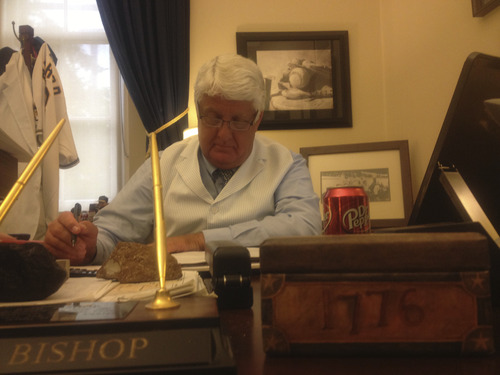This is an archived article that was published on sltrib.com in 2013, and information in the article may be outdated. It is provided only for personal research purposes and may not be reprinted.
Washington • It's 8:32 a.m. on a steamy day in the nation's capital when Rep. Rob Bishop emerges from his Capitol Hill apartment, smartly dressed in a three-piece seersucker suit. It is Seersucker Wednesday after all.
Bishop will pass several other folks donning similar white, pinstriped suits when he hits the Capitol later, but first on the agenda is bacon and quiche with members of various European parliaments.
The Utah Republican strides into the Library of Congress, brushing past the metal detector as only members can do. He won't come back outside for more than 12 hours.
While Americans might think members of Congress live a glamorous life — glad-handing donors, laughing it up at cocktail parties, cavorting around in black town cars — in reality, it's more about shuttling between meetings, keeping tabs on the intricacies of a slew of legislation and maneuvering ways to pass your bills and kill the other guy's.
Members of Congress typically head out each morning facing a packed schedule, filled with lobbyist meet-and-greets, constituent photo ops, drawn-out hearings and sometimes-dicey votes.
It's a part of the life of a member of Congress that doesn't show up on C-SPAN.
Like the breakfast.
Rep. Mike Turner, R-Ohio, greets the crowd inside an ornate Library of Commerce room by noting that a British member had praised how beautiful the building was. Ironic, Turner says, since in the War of 1812, it was the British who burned down the original.
Chuckles fill the room of 27 officials from NATO countries, one senator and a handful of House members, including Bishop. Once the remarks have ended, the Utahn is surrounded by folks from Greece, Canada, Croatia, Great Britain and the Netherlands. Hands are shaken, cards exchanged and Bishop departs, opting to take the tunnel to his office building as the skies are pouring.
The entire Capitol complex is accessible by tunnel — if you know where you're going. Bishop has done this only once, joking that he wanted to see how close he could get to his apartment before having to go above ground.
"We really like your suit," giggles a young girl from Arkansas in a bright green 4-H shirt. Bishop poses for some photos and heads for the tunnel adventure. Ten minutes later, he reaches the Cannon House Office Building, his other home.
Bishop left the office at 11:30 p.m. the night before, he says, after phoning constituents who had one problem or another with the federal government. A friendly staff greets the congressman in Cannon 123 and at 9:41 a.m., Bishop pops open the first of many Dr Peppers.
"How was the breakfast?" asks Bishop's communications director, Melissa Subbotin, as she drops into the office. Fine, he responds, as a few aides begin queuing up to chat with the boss. Bishop talks to one about an education bill and hands over talking points he got from a fellow Republican who isn't a fan.
—
'Dumb' bill • "That's what they sent out on why my bill is so dumb," Bishop says.
An intern brings out a letter to a constituent about sugar cane subsidies and a flat tax; Bishop suggests reworking the response to focus more on the flat-tax issue and less on sugar cane since Utah doesn't grow the stuff. Another intern isn't sure how to answer a constituent who is worried about immigrants in the country illegally trying to claim a tax return by citing dependents in Mexico.
Bishop, too, looks flummoxed.
"Put that in the call pile," he says, planning to later phone the letter writer for a conversation the congressman hopes will assuage his concerns.
A long, single buzzer calls out. The House is now in session.
Bishop remains in his office, checking through emails and other constituent letters, some of them a bit kooky and misinformed.
"Sometimes I just thank them for the information," Bishop says of those kind of notes. Emails, he notes, seem more anonymous for some reason and therefore can be more vicious and rude. But letters can carry a hateful tone, too.
"Most people are nice when I call them back," he adds.
—
Why Washington sucks • In D.C., Bishop is known as Utah's go-to guy on military issues and public lands and sits on the two pertinent committees. But to constituents back home in the 1st Congressional District, Bishop is the guy asked to explain why everything in Washington sucks.
"I don't know why [people] expect me to do something and magically get everything done," he says.
Still, with a small team of legislative assistants, he tries.
It's 10:22 a.m. And the Rules Committee sends out a note about a possible meeting to be called later in the day. Eight minutes later, Bishop is discussing strategy on immigration-reform bills to try and push his effort to allow the Border Patrol to waive environmental laws.
At 11 a.m., the office is buzzing. Bishop laughs at an email newsletter from the Republican Study Committee that left out a key letter in the word "shift."
"Are you allowed to wear seersuckers when the sun isn't out?" asks Chief of Staff Scott Parker, the first of eight aides who have arrived for a daily confab. Bishop's subcommittee will meet three consecutive days the next week, a bevy of legislation is waiting in the hopper and the congressman gets an update on who is testifying about what.
"Could you find enough witnesses?" he quips, peering over a list of eight experts for a single hearing.
—
On the record • There's debate about whether Bishop should press Interior Secretary Sally Jewell on whether the administration will use its unilateral power to designate more national monuments. They know what she'll say, of course, but want her on the record. He ends up asking other questions.
Days are planned out months in advance and Bishop's office is planning to convene a joint hearing in how the U.S. Park Police lost track of service weapons.
"Look, anyone can lose a thousand guns," Bishop jokes. "Give them a break."
Gun jokes are instantly popular in the room and the briefing breaks up, five minutes over schedule.
In Congress, everything is over schedule.
"Typically there is no typical day," says Bishop's Utah GOP colleague, Jason Chaffetz. "You start off with a well-planned calendar and by the time lunch rolls around, it's inevitably blown up."
Chaffetz notes during one cold winter, he went three days without stepping outside; the Utahn sleeps in his office. There are early mornings and late nights, and little rest for the weary, Chaffetz adds, noting Hollywood's version of Congress isn't very accurate.
"It looks good in the movies but not part of my reality," Chaffetz says, noting that members are restricted to toothpick-type appetizers at any lobbyist-paid receptions. "You can't have a sit-down dinner unless you're personally paying for it."
—
Retail politics • Back in Bishop's office, the Utah Retail Merchants Association is up next, seeking Bishop's support for legislation to require big online-only shops to collect sales taxes like brick-and-mortar stores do.
"Before we begin, Jashon: great kid," says the group's president Dave Davis, referring to Bishop's youngest son. Small talk and compliments always help with lobbying.
The pitch is as expected: How are neighborhood stores supposed to compete when online shops get away without collecting taxes?
Asked for his support, Bishop pivots. What's Plan B, he asks. Bishop stays noncommittal but shakes group members' hands as they leave.
Thirty minutes to spare before a Republican Study Committee, and Bishop fills it with another briefing on legislation. What about lunch? "I don't," he deadpans.
The members-only meeting lasts 45 minutes. And lunch is served.
An hour later, Bishop jaunts over to a closed-door Republican caucus meeting on immigration, passing — through another tunnel — what seems like every credentialed reporter at the Capitol.
The congressman and about 200 of his House Republican colleagues cloistered themselves in a massive meeting room, where for three hours they discussed how they'd handle immigration reform. Bishop took a few moments during the meeting to argue that any immigration reform they pass should allow Border Patrol agents to drive unencumbered onto federally protected lands to pursue border crossers.
As a few members later trickled out, the horde of journalists pounced. But Bishop slipped out another exit and headed to the House floor to vote.
—
Still going • Just before 7 p.m., Bishop is back in his office to welcome a nervous group of interns from Utah State University.
"I know how much you look forward to these," Bishop says as the pencil-skirt and suit-wearing crowd piles into the office and snatches slices of free pizza.
Bishop passes on the pie and grabs another Dr Pepper.
Public lands dominate the congressman's initial remarks, and immigration comes up again. The Senate version, he says, is "just incredibly stupid."
Joshua Blume, an intern from the office of Sen. Orrin Hatch, R-Utah, asks one of the first questions.
"If you could have a cabin in any one national park, which one would it be?" he queries.
"Do you think I like cabins?" Bishop responds. "I am not an outdoors person."
It's past 8 p.m. when the interns shuffle out. Bishop remains to tackle some of those folks in the "call pile." He later flips the lights off in his office and heads home as the sun sets.
Thursday, it begins all over again.
Isobelle Markham and Matt Canham contributed to this story.





